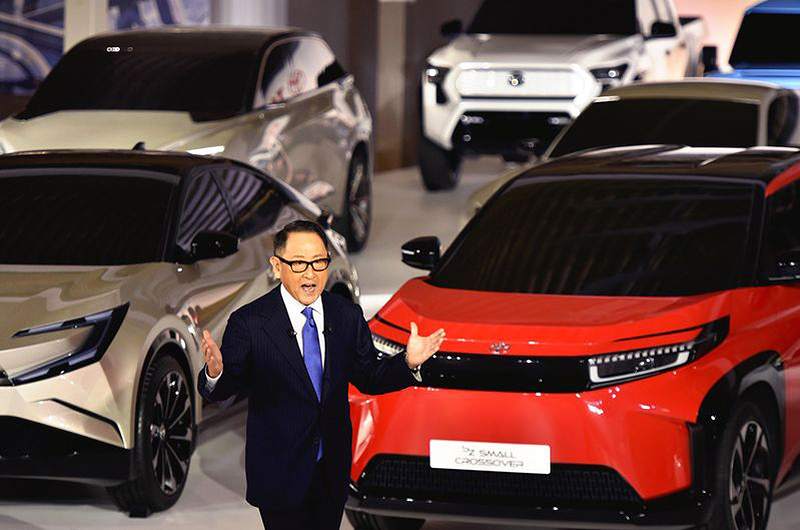
Toyota Motor Corp. President Akio Toyoda announces the automaker’s new electric vehicle strategy at a media briefing in Koto Ward, Tokyo, on Tuesday.
16:16 JST, December 15, 2021
Toyota Motor Corp. has announced plans to significantly expand its lineup of electric vehicles, a move that is likely to accelerate the shift to electrification among other carmakers.
The world’s largest automaker aims to achieve global sales of 3.5 million EVs per year by 2030, a major increase from its previous goal of 2 million, including fuel cell vehicles.
With the drive toward decarbonization gaining speed throughout the automotive industry, Toyota is planning to invest ¥4 trillion in plants, equipment and research and development to boost its electric vehicle strategy.
The new target of 3.5 million units is more than one-third of Toyota’s total global sales in 2020. The auto giant had previously planned to roll out 15 EV models by 2025, but this figure has now been doubled to 30 by 2030.
The bZ4X, a sport-utility vehicle set to hit the market in mid-2022, will be the first model in a new series of Toyota EVs that will range from small cars to large SUVs and sedans.
Toyota’s luxury Lexus brand plans to have a full lineup of electric vehicles and achieve 1 million units in global EV sales.
Lexus is aiming for EVs to account for 100% of global sales in 2035.
Toyota also plans to invest a total of ¥8 trillion between 2022 and 2030 on plants, equipment and the development of vehicles, including hybrid and fuel cell vehicles.
The company will increase investment in the production of batteries — a core component of EVs — from ¥1.5 trillion announced in September to ¥2 trillion. Toyota is also considering installing fast-charging stations at all of its dealerships across Japan by 2025 to promote the spread of electric vehicles.
“At present, the energy situation varies greatly from region to region,” Toyota President Akio Toyoda said at a media briefing in Tokyo on Tuesday. “That is exactly why Toyota is committed to providing a diversified range of carbon-neutral options for various situations and needs.”
The rapid shift toward low or zero carbon-emission vehicles is increasing the possibility that fossil fuel-powered vehicles could become unmarketable in some major markets, such as Europe.
In April, Honda Motor Co. announced a target of selling only battery-powered electric or fuel cell vehicles by 2040.
Honda was the first major Japanese automaker to declare that it would stop manufacturing gasoline-powered vehicles, including hybrids, at some point in the future.
In November, Nissan Motor Co. said it aims to invest about ¥2 trillion in electrification, including EVs, over the next five years and sell 15 new electric models globally by fiscal 2030.
Nissan’s strategy takes into account the differing conditions in various regions around the world, such as recharging infrastructure, and also places importance on the company’s hybrid vehicle technologies.
The shift to electric vehicles has been even more pronounced among automakers in Europe, partly due to the European Union’s tougher emissions regulations.
Mercedes-Benz plans to go all-electric by 2030, while Audi, part of the Volkswagen Group, has announced that all its new vehicles will be EVs from 2026.
Top Articles in Business
-

Prudential Life Insurance Plans to Fully Compensate for Damages Caused by Fraudulent Actions Without Waiting for Third-Party Committee Review
-

Narita Airport, Startup in Japan Demonstrate Machine to Compress Clothes for Tourists to Prevent People from Abandoning Suitcases
-

Japan, U.S. Name 3 Inaugural Investment Projects; Reached Agreement After Considerable Difficulty
-

Toyota Motor Group Firm to Sell Clean Energy Greenhouses for Strawberries
-

SoftBank Launches AI Service for Call Centers That Converts Harsh Customer Voices into Softer Voices
JN ACCESS RANKING
-

Japan PM Takaichi’s Cabinet Resigns en Masse
-

Japan Institute to Use Domestic Commercial Optical Lattice Clock to Set Japan Standard Time
-

Israeli Ambassador to Japan Speaks about Japan’s Role in the Reconstruction of Gaza
-

Man Infected with Measles Reportedly Dined at Restaurant in Tokyo Station
-

Videos Plagiarized, Reposted with False Subtitles Claiming ‘Ryukyu Belongs to China’; Anti-China False Information Also Posted in Japan




















